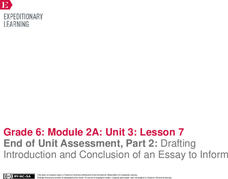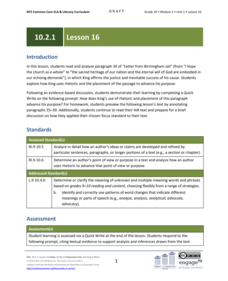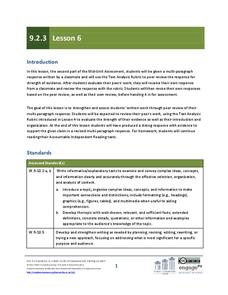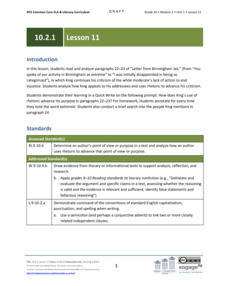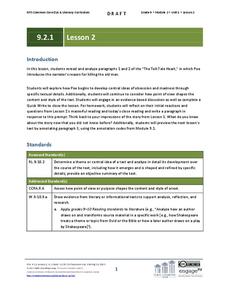Curated OER
Editing Marks, Part 1
Dander from the show Twisted Whiskers and characters from My Little Pony are featured in this three part lesson that explores using story pyramids to scaffold ideas, adding sensory details to enrich writing, and editing using common...
EngageNY
End of Unit Assessment, Part 2: Drafting Introduction and Conclusion of an Essay to Inform
A powerful introduction and conclusion can really pack a punch. Using the resource, scholars first read and discuss a model essay. Then, as part of the end of unit assessment, they draft the introductory and concluding paragraphs of...
Curated OER
Pizza Biography
A biography writing lesson with a tasty twist! Kids create a "visual biography" in which each pizza slice represents a paragraph, and toppings represent supporting details. They learn research techniques, note-taking skills, and how to...
Curriculum Corner
Guest Teacher Plans Grade 4
Creating substitute plans may not be the highlight of your workday. Make the task less daunting with a general, day-long plan covering math, reading, word work, and writing.
EngageNY
Determining Main Ideas and Details to Write a Summary Paragraph: “Food”
Let's eat! Scholars read pages 24-25 of The Inuit Thought of It to discover the foods eaten by the Inuit. They sketch a visual gist of the section in their journals and write a summary paragraph about the text.
Roald Dahl
Matilda - Throwing the Hammer
Full truth, or an exaggeration? How can you tell when a storyteller is exaggerating a story? Readers analyze a story told by Hortensia, and identify the exaggerative language she uses. Then, learners write their own narrative story using...
Curated OER
Making Magical Creatures Talk
Invite your young writers to take the reins with writing dialogue. Using two characters of their own creation, kids work with partners and then individually to write short conversations.
Roald Dahl
Matilda - The First Miracle
As the story unfolds, readers discover Matilda has a superpower. Take part in an activity that has learners talking about what superpower they would have, how they would use it, and how it could help others. Then, after reading the...
EngageNY
Grade 10 ELA Module 2: Unit 1, Lesson 16
Take your place in the world—or the text. Scholars look at how the placement of a particular paragraph adds to the meaning of "Letter from Birmingham Jail" by Martin Luther King Jr. Before working on a quick write activity; readers...
EngageNY
Close Reading: Paragraphs 2 and 3 of “Refugee and Immigrant Children: A Comparison” and Introducing the NYS Expository Writing Rubric
What factors make adaptation successful for refugee and immigrant children? The class explores the topic by reading two paragraphs from "Refugee and Immigrant Children: A Comparison." Next, they engage in a think-pair-share to discuss...
EngageNY
Grade 9 ELA Module 2, Unit 3, Lesson 6
As part of a mid-unit assessment, class members exchange their draft of a multi-paragraph essay with a classmate, review their partner's writing using the provided text analysis rubric, and evaluate the strength of evidence, the...
Curriculum Corner
Guest Teacher Plans: Grade 6
Taking a day off of school can feel like a lot more work than going because of the time and effort that goes into making sub plans. Make your life easier with a daily plan for a guest teacher designed to meet the needs of sixth...
EngageNY
Grade 9 ELA Module 1, Unit 2, Lesson 4
As a mid-unit assessment, class members demonstrate their understanding of the concepts covered so far by crafting a formal, multi-paragraph essay in which they analyze how Rainer Maria Rilke's word choices develop the meaning and tone...
EngageNY
Grade 10 ELA Module 2: Unit 1, Lesson 8
Readers analyze paragraphs from the "Letter From Birmingham Jail" and determine King's purpose and how he supports it. Scholars discuss given questions with their peers, learn new vocabulary words, and complete a quick writing prompt.
EngageNY
Grade 10 ELA Module 2: Unit 1, Lesson 11
Choose your words carefully. Martin Luther King Jr. carefully chooses his words to provide evidence to support his claim about segregation. Scholars work in pairs to discuss previous lessons, complete homework assignments, determine the...
EngageNY
Grade 10 ELA Module 4: Unit 2, Lesson 15
What goes around, comes around. Using the resource, pupils read Act 4.3 of Macbeth, in which Macduff and Malcolm plan to attack Macbeth. Scholars then hold a discussion and complete writing activities to analyze Shakespeare's structural...
EngageNY
Grade 9 ELA Module 2: Unit 1, Lesson 2
Make up your mind to complete a lesson plan about "The Tell-Tale Heart" and forever rid yourself of simple sentence structures. As ninth graders analyze the first two paragraphs of Edgar Allan Poe's short story, they consider how text...
EngageNY
Grade 10 ELA Module 2: Unit 1, Lesson 18
Examine how Martin Luther King Jr.'s final paragraphs of "Letter from Birmingham Jail" summarize the ideas throughout the piece. Readers discuss word usage and new vocabulary and complete guided questions to better understand how the...
EngageNY
Grade 10 ELA Module 4: Unit 1, Lesson 3
Are authors also designers? Scholars examine closely how E.B. White designs a section in Death of a Pig. They determine how the structure of sentences and paragraphs, the order of events, and the dialogue placement all contribute to the...
EngageNY
Grade 10 ELA Module 2: Unit 1, Lesson 15
Some things are worth doing again. Scholars take a look to see which ideas Martin Luther King Jr. revisits and refines in his "Letter from Birmingham Jail." To help with the process, readers answer guided questions, look at word...
Curated OER
Five Paragraph Essay
Students create a standard outline, using a word processing tool, while they are learning about the basic writing device of the 5 paragraph essay.
Curated OER
Writing a Business Letter to Compare and Contrast
Students compose business letters. In this writing skills lesson, students use the business letter format as they note cause and effect relationships between the weight epidemic in the United States and changing menus in American...
Curated OER
Six Trait Writing with Jonathan Swift and Washington Irving
Fourth graders demonstrate and evaluate the six traits of writing. They read and identify good writing and bad writing, utilize a rubric to self-evaluate their own writing, participate in a Reader's Theater, and publish a class book.
EngageNY
End of Unit 2 Assessment: Working with Two Texts - Reading, Listening, Summarizing, and Synthesizing
As a summative assessment for this unit on colonial trade, fourth graders listen to and read informational texts in order to demonstrate their ability to take notes, write summaries, and draw connections. Young scholars first listen as...

